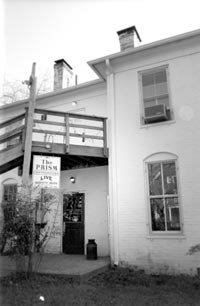NEWS-Sound of silence: Prism hosts its last concert
How fitting that musicians Jay Ungar and Molly Mason ended the final set of their Saturday, April 22, Prism Coffeehouse show with the haunting "Ashokan Farewell."
The performance was the farewell concert for the historic smoke- and alcohol-free venue that announced in a scathing letter on its website the previous day that its planned move had fallen through and that the doors would close "indefinitely." The letter blamed a slew of entities– including The Hook– for its demise.
But Ashokan is also the theme song of Ken Burns' PBS film, The Civil War, and the Prism in recent years has known too well the pain of being a house divided.
On The Hook's blog, thehook.net, that division is evident– especially in opinions about the Prism's artistic director, Fred Boyce.
Some point out that Boyce was the driving force in bringing renowned acts such as Crooked Still, John Cephas, Pierre Bensusan, and Alex DeGrassi to the stage in the 16 years that he has been artistic director.
"Fred had a huge relationship with all the artists he booked, and he's the one who brought the real amazing acts like Doc Watson to Charlottesville!" wrote Mark Brown.
But other posts recall Boyce's fiery temper, which put him in the news two years ago.
In The Hook's April 1, 2004 cover story, "Prism Schism: Folk venue feels mighty wind of dischord," some former volunteers and board members worried that Boyce and his partner, Kenyon Hunter, had "hijacked" the Prism by intimidating dissenters and doing away with open board elections. That move, they claimed, was a violation of the Prism's bylaws and had allowed Boyce to essentially take ownership of the nonprofit venue.
Following The Hook's 2004 article, Prism volunteers entered mediation, and the Prism held a board election in May 2004. Both Boyce and Hunter retained their seats.
The Prism continued to host performances, but in January, news emerged that the Prism planned to move from its Rugby Road home, owned by Westminster Presbyterian Church, and buy a larger two-building property in Gordonsville that once housed O'Dell's restaurant.
The announcement took many by surprise– including the Church.
"They've made no mention of moving," Westminster administrator Wally Camp said at the time. By late April, however, a real estate agent confirmed that the $750,000 Gordonsville property was once again listed for sale– indicating that the Prism transaction had fallen through. Meanwhile, Camp revealed that the Church had already lined up a new tenant for the Rugby Road space, leaving the Prism homeless.
Boyce and Hunter, Camp said, had balked at the church's request to increase the Prism's monthly payment from $370 to $500 – a sum that included not just rent but also utilities and some maintenance for the approximately 4,000-square-foot space.
(By contrast, back in 1990, the then-fledgling Live Arts paid more than $3,000 a month for its original space.)
Despite the Prism's apparent sweetheart deal, Camp said that Boyce and Hunter were "offended" by the Church's request for more money. Camp reiterated that the Church wanted to make it work with the Prism, but that lack of communication made that impossible. His calls to Boyce were unreturned, he said.
In the Prism's unsigned goodbye letter– posted at theprism.org for one day before an edited version appeared and then was also taken down– the author criticized the Church as "unbelievably out of touch with the wonderful thing that has been happening just next door since 1999."
The Church was not the only target.
The letter attacked "certain nonprofit radio announcers"– an apparent stab at WNRN for allegedly violating FCC regulations by "enthusiastically and heavily" promoting for-profit events.
WNRN founder Mike Friend logged on to theHook.net to deny the accusation.
"We made it clear early on that we would work with Fred any way we could," Friend contends, "[but] we could not run saturation campaigns for no compensation for Prism shows."
Friend adds that Boyce's temper eventually spelled the Prism's demise. "At some point, commitment and artistic vision can become a straitjacket and even a justification for violating norms of behavior that will drive other people away," Friend writes.
Although neither Boyce nor Hunter returned The Hook's repeated calls for comment for any of the articles, the unsigned letter revealed a disdain for the paper.
"The Hook staff has absolutely no knowledge or understanding of this music, or of what the Prism is about, and have simply attempted repeatedly to create an impression of disharmony and controversy where none really exists...."the writer said.
As former Prism volunteers and Westminster Church grapple with the idea that for the first time in 40 years something other than the Prism will occupy the white house at 214 Rugby Road, ripples of the Prism's closing have spread.
When reached at the University of Toledo in Ohio, where he is now a professor in the honors program, Prism founder Tom Barden– who was a UVA student when he started the Prism in 1966– expressed shock.
"That's like a death in family," he says. "I just can't believe it won't come back in some form. Charlottesville without the Prism just doesn't compute."

Show-goers enter the smoke-free, alcohol-free venue from the Gordon Avenue side of the building, pictured here.
FILE PHOTO BY JEN FARIELLO
#